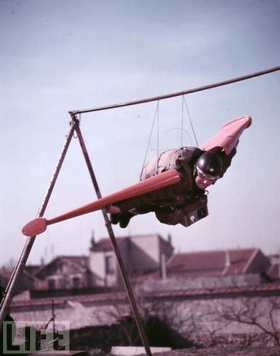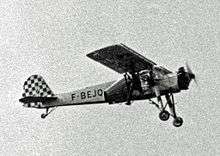Léo Valentin

Léon Alfred Nicolas "Léo" Valentin (22 March 1919, Épinal (Vosges), France - 21 May 1956, Liverpool, England) was a French adventurer, who attempted to achieve human flight using bird-like wings. Léo Valentin is widely considered to be the most famous "birdman" of all time.[1][2][3] He was billed as "Valentin, the Most Daring Man in the World".[4]
Biography
Early involvement in parachuting
Léo Valentin was born in 1919 in Épinal (Vosges), France. He always had a keen interest in airplanes, and read avidly about powered aircraft and gliders. His ultimate dream was to be able to fly like the birds. At the outbreak of the Second World War he planned to become a fighter pilot, but opted to train as a paratrooper. At age 19, he joined a group of French paratroopers in Baraki, Algeria.
After the outbreak of World War II and the fall of France, he became an instructor with the rank of sergeant at a parachute school in Fez, Morocco. He then sailed to England for retraining, parachuted into Brittany as a saboteur in June 1939 and was wounded in the arm in a firefight at Loire.[5]
After the war Valentin again served as a parachute instructor and directed his attention toward his lifelong ambition. While still in the French Army he developed the jumping technique known as the "Valentin position", allowing him better control of his movements in the air. In February 1948 he set a record for the longest free fall without a respirator (15,600 feet). He subsequently made another free fall of 20,200 feet, and set a record for the longest night free fall (14,550 feet). Shortly thereafter he left the army after ten years of service to continue his experiments as a civilian.[6]
Birdman: from concept to practice

At Villacoublay airfield, near Paris, Valentin attempted his first "wing jump" using wings made of canvas, but he failed to achieve any forward speed. He then tried rigid wings to prevent the wings from collapsing. On 13 May 1954, with the help of a set of rigid wooden wings, he finally managed some kind of stability with the initial spiral. Valentin later claimed that he managed to fly for three miles using his wooden wings.[7][8]
Death
On 21 May 1956 Valentin was at a Whitmonday air show in Liverpool before 100,000 spectators (including three-year-old Clive Barker), using wings similar to the wooden ones that had brought him success in the past, but longer and more aerodynamic. However, the stunt immediately went wrong.[8][9] When exiting the plane, one of his wings made contact and a piece broke away. He attempted to land safely using a parachute, but that also failed: Valentin died.[10][11]
The body of Leo Valentin arrived by plane at the airbase Luxeuil-St-Sauveur (BA 116), where military honours were rendered to him. Placed on a command car of the French Air Force and covered with flowers, the body arrived at the church of Saint-Sauveur, Haute-Saône on 3 June 1956.
See also
References
- ↑ Nicholas, Adrian (April 2000). "Lion at Heart". skydive The Mag. British Parachute Association. Archived from the original on 13 December 2007. Retrieved 17 October 2012.
- ↑ "HickokSports.com - History - Sport Parachuting". Ralph Hickok. Retrieved 16 October 2012.
- ↑ Abrams, Michael (2006). Birdmen, Batmen, and Skyflyers: Wingsuits and the Pioneers Who Flew in Them, Fell in Them, and Perfected Them. New York: Harmony Books. pp. 113–132. ISBN 978-1-4000-5491-6.
- ↑ Abrams, p. 127.
- ↑ Abrams, pp. 114-115.
- ↑ Abrams, pp. 115-120.
- ↑ Koyn, Tamara (1999). "Quincy 99 Bird-Man Seminar". Tamara Koyn. Retrieved 16 October 2012.
- 1 2 Abrams, p. 130.
- ↑ "Birdman Suit, 1955 - 30 Dumb Inventions". LIFE magazine. See Your World LLC. 2009. Archived from the original on 21 May 2009. Retrieved 17 October 2012.
- ↑ "Bird Like Flyer Plunges To Death". Associated Press. May 21, 1956. Retrieved 16 October 2012.
Leo Valentin, the Frenchman who tried to fly like a bird, was killed today trying to glide from a plane at 9,000 feet. ...
- ↑ Abrams, p. 131.
Bibliography
- Perrin, Claude (2006). Léo Valentin (1919-1956) - Les hommes volants, un précurseur [Léo Valentin (1919-1956) - The flying men, a precursor]. Nouvelles Éditions Latines. ISBN 2-7233-2067-7.